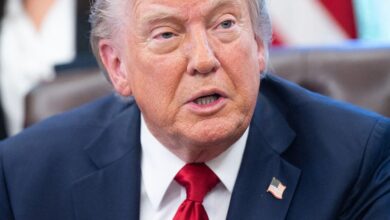These companies say they’re investing more in U.S. manufacturing as tariffs go into effect

manufacturing investment is a testament to our long-standing commitment to the U.S. and to advancing the health of people everywhere.”
New Balance
American shoe company New Balance is expanding its U.S. manufacturing capabilities by investing $200 million to open a new factory in Methuen, Massachusetts. The move is expected to create 2,000 new jobs in the state.
New Balance has been vocal about its support for domestic manufacturing, emphasizing the importance of American-made products. The company has cited the tariffs as a factor in its decision to increase production in the U.S.
Toyota
Japanese automaker Toyota announced plans to invest $13 billion in U.S. manufacturing over the next four years. The company said it will increase production capacity at its existing plants and build new facilities in several states, including Alabama, Kentucky, Missouri, Tennessee, and West Virginia.
Toyota’s investment is part of its broader strategy to increase production of electric and autonomous vehicles in the U.S., as the company aims to stay competitive in the rapidly evolving automotive industry.
Walmart
Retail giant Walmart announced a $350 billion commitment to expand its U.S. manufacturing capabilities over the next 10 years. The company said it will work with suppliers to increase domestic production of goods sold in its stores, with a focus on supporting American jobs and communities.
Walmart’s investment is expected to create thousands of new jobs in the U.S. and strengthen the company’s supply chain resilience by reducing its reliance on foreign suppliers.
Overall, the recent wave of announcements from corporations expanding their manufacturing capabilities in the U.S. reflects a mix of factors, including the impact of tariffs, the desire to support American jobs, and the need to meet growing demand for products. While the full extent of these investments remains to be seen, they signal a shift towards greater domestic production and job creation in the U.S.
A groundbreaking investment is underway in Wilson, North Carolina, as a high-tech facility is set to manufacture cutting-edge medicines for patients in America and around the world. This new facility will focus on producing next-generation medication for individuals battling cancer, immune-mediated diseases, and neurological conditions. The pharmaceutical company behind this initiative also plans to expand capacity at existing domestic plants, creating high-paying, high-technology jobs in the process.
In a similar move, Honda Motor has announced the relocation of production for its Civic Hybrid Hatchback from Japan to the U.S. This decision comes in response to tariffs imposed by the Trump administration, including a 25% tariff on vehicles and auto parts imported into the country. Honda’s Civic Hatchback Hybrid will now be exclusively produced in Indiana, consolidating its manufacturing operations in the United States.
Meanwhile, Hyundai Motor Company has committed $21 billion to investing in domestic manufacturing from 2025 to 2028. A significant portion of this investment will go towards expanding domestic automobile production to 1.2 million vehicles per year. Hyundai’s decision to deepen its partnership with the United States underscores its commitment to American industrial leadership and the growth of its workforce in the country.
In a historic move, American chip maker Nvidia has announced plans to manufacture chips and AI supercomputers in the U.S. for the first time. The company will utilize over a million square feet of manufacturing space in Arizona and Texas to build its Blackwell chips and AI supercomputers, with an expected production value of up to half a trillion dollars. This strategic decision aims to meet the growing demand for AI infrastructure, strengthen the supply chain, and enhance resiliency.
Swiss pharmaceutical giant Roche has also made a significant investment in its U.S. operations, committing $50 billion to expand research and development sites and manufacturing facilities across the country. The company will establish a new 900,000-square-foot manufacturing center dedicated to its weight loss medicine portfolio, further solidifying its presence and commitment to innovation in the U.S.
Taiwanese semiconductor manufacturer TSMC has announced a total investment of $165 billion in U.S. manufacturing capabilities, including plans for three new plants, two advanced packaging facilities, and a major research and development center. This investment builds upon an existing $65 billion commitment in semiconductor manufacturing operations in Phoenix, reflecting TSMC’s commitment to advancing technology and innovation in the United States.
These groundbreaking investments underscore the importance of domestic manufacturing and innovation in driving economic growth, creating high-quality jobs, and advancing cutting-edge technologies to benefit patients and consumers worldwide. The collaboration between these companies and the U.S. underscores a shared vision for industrial leadership and innovation in the global marketplace.





